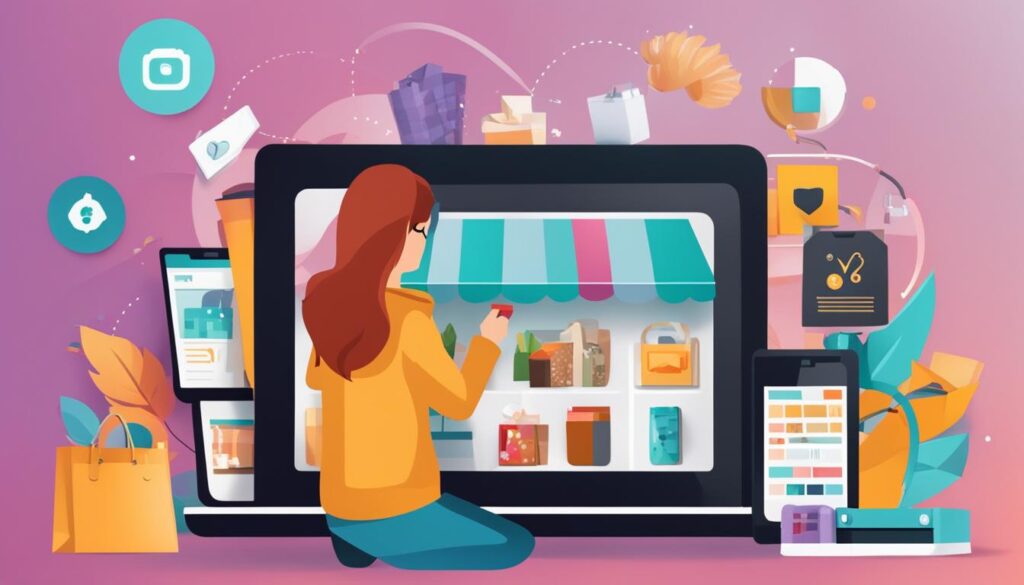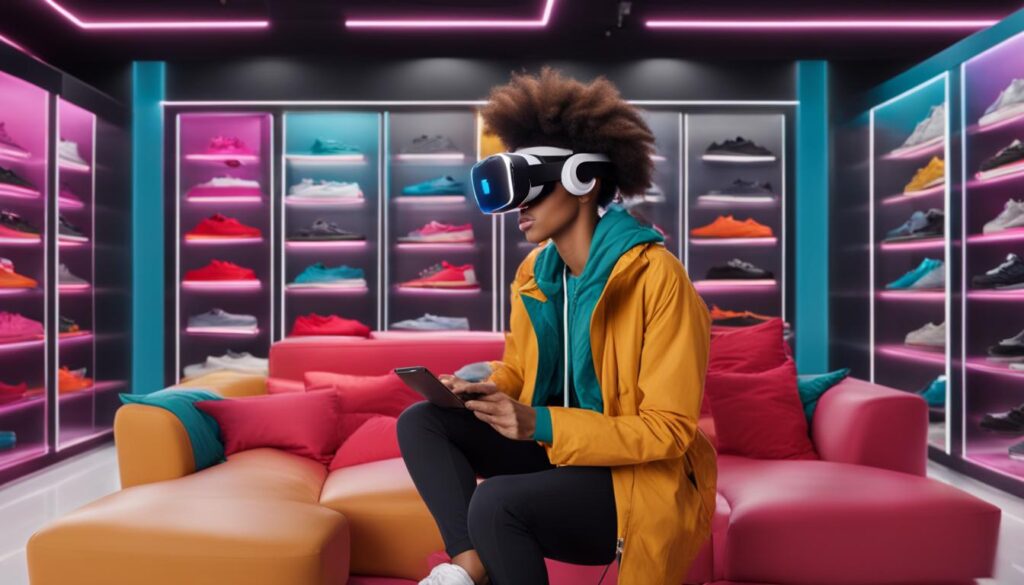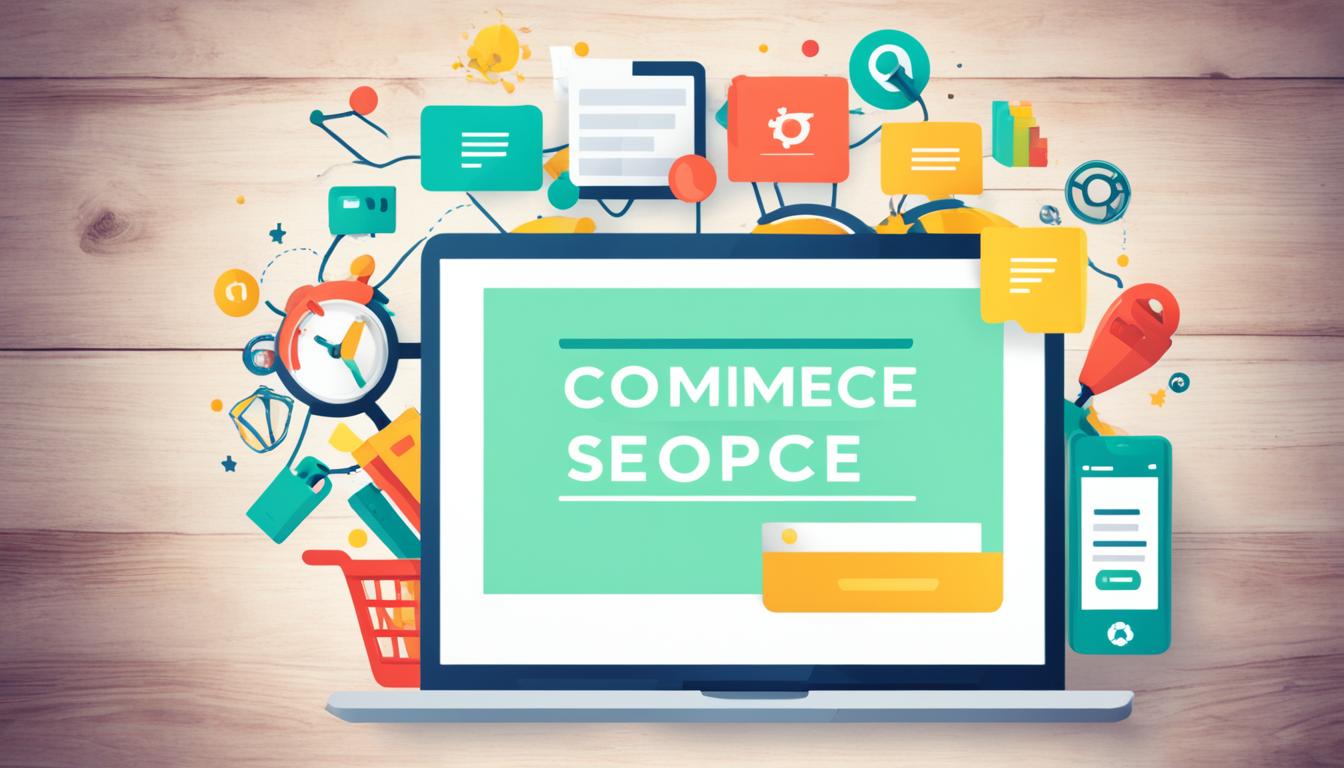Welcome to the exciting world of e-commerce, where online shopping is transforming the way we experience the digital marketplace. With the rise of technology and the convenience of online stores, e-commerce has become a vital part of our lives, offering a plethora of products and services at our fingertips.
In this article, we will explore the future of e-commerce and the thrilling trends and innovations that are set to revolutionize the online shopping landscape. From the integration of mobile shopping and personalized retail experiences to the power of influencer marketing and the incorporation of augmented reality and virtual reality, there are endless possibilities for the future of online commerce.
Join us as we delve into the latest developments in the e-commerce industry and discover how these advancements are reshaping the way we shop online. Get ready to embrace the future of e-commerce and stay ahead of the game in this dynamic and ever-evolving digital marketplace.
Key Takeaways:
- Mobile shopping is experiencing explosive growth, revolutionizing the e-commerce landscape.
- Personalization and customization in online retail are driving customer loyalty and engagement.
- Influencer marketing has become a powerful tool for brands in the online commerce space.
- Augmented reality and virtual reality technologies are enhancing the online shopping experience.
- Voice commerce is reshaping the way consumers interact with e-commerce platforms.
The Rise of Mobile Shopping
Mobile shopping has revolutionized the world of e-commerce, with a significant increase in consumers using smartphones and tablets for their online shopping needs. These electronic devices have become indispensable tools for browsing and making purchases, offering convenience and accessibility like never before.
In recent years, the growth of mobile shopping has been nothing short of explosive. With the advancement of technology and the widespread availability of high-speed internet, customers are now able to shop on-the-go, anytime and anywhere. This shift in consumer behavior has had a profound impact on the e-commerce landscape, prompting businesses to adapt and optimize their online stores for mobile users.
One of the key advantages of mobile shopping is the seamless user experience it offers. Mobile-responsive websites and dedicated apps ensure that the online store is tailored specifically for smaller screens, providing a smooth and intuitive shopping journey. With a few taps and swipes, customers can easily explore product options, compare prices, and make secure electronic transactions.
Moreover, the rise of mobile shopping has also fostered an era of personalized and targeted marketing. E-commerce platforms can leverage customer data and behavior patterns to deliver tailored product recommendations and promotions directly to the customer’s mobile device. This level of personalization not only enhances the shopping experience but also increases customer satisfaction and loyalty.
The Impact on E-commerce
The rise of mobile shopping has brought about several significant changes in the realm of e-commerce:
- Increased Accessibility: With mobile devices becoming more affordable and widespread, more people than ever have access to online shopping opportunities.
- Convenience: Mobile shopping allows consumers to browse and purchase products while on the move, saving time and providing flexibility.
- Global Reach: The internet’s reach via mobile devices knows no geographical boundaries, expanding the customer base for online stores exponentially.
- Enhanced Engagement: With push notifications, personalized offers, and interactive features, e-commerce businesses can engage with customers more effectively, fostering brand loyalty and repeat purchases.
The visual above illustrates the rapid growth of mobile shopping worldwide, highlighting the increasing number of people using smartphones for online purchases. As the graph clearly shows, this upward trend is set to continue, making mobile optimization a crucial aspect of any successful e-commerce strategy.
“Mobile shopping has transformed the way consumers engage with e-commerce. It offers convenience, accessibility, and personalized experiences, making it an integral part of the digital marketplace.” – Industry Expert
As the popularity of mobile shopping continues to soar, businesses must prioritize mobile optimization and adapt their strategies to meet the ever-evolving needs of mobile shoppers. By providing a seamless and user-friendly mobile experience, e-commerce brands can not only attract new customers but also retain their existing customer base, driving growth and success in the online marketplace.
Personalization and Customization in Online Retail
In today’s competitive e-commerce landscape, personalization and customization are becoming essential factors in delivering a superior online shopping experience. E-commerce platforms are leveraging customer data to tailor their offerings, providing personalized recommendations and unique product experiences that cater to individual preferences. This level of personalization not only enhances customer satisfaction but also fosters a sense of loyalty and engagement.
Through advanced algorithms and machine learning, online stores can analyze customer behavior, purchase history, and demographic information to understand their preferences and needs. This valuable data enables e-commerce businesses to curate personalized product recommendations, targeted offers, and customized promotions that resonate with each customer.
The Power of Personal Recommendations
One of the most effective methods of personalization is the use of personalized recommendations. By analyzing a customer’s browsing and purchase history, e-commerce platforms can suggest products that align with their interests, making the shopping experience more relevant and convenient. This not only saves customers time but also showcases the breadth of an online store’s offerings, increasing the likelihood of additional purchases.

Customizing Products to Meet Individual Needs
Another aspect of personalization is the ability to customize products to meet individual needs. Online retailers are offering options for customers to personalize their purchases, whether it’s choosing specific features, colors, or adding personalized engravings. This level of customization creates a sense of ownership and exclusivity, making customers feel more connected to the brand and the product.
Building Trust and Loyalty
Personalization in online retail goes beyond tailored recommendations and customized products. It extends to personalized communication, such as targeted email marketing campaigns and personalized promotions. By addressing customers by name and offering exclusive discounts based on their preferences, e-commerce businesses can build trust and foster loyalty.
“Personalization is no longer a luxury; it’s an expectation. Customers want to feel valued and recognized by the brands they engage with online.”
The seamless integration of personalization and customization in online retail is reshaping the e-commerce landscape. As more businesses recognize the importance of delivering tailored experiences, customer expectations continue to rise. To stay competitive in the digital marketplace, businesses must prioritize personalization and customization, leveraging customer data and technologies to create unforgettable shopping journeys.
The Power of Influencer Marketing in E-commerce
Influencer marketing has become a game-changer in the world of e-commerce. Brands are now leveraging the power of social media influencers to promote their products and connect with new audiences. With the rise of online shopping and digital marketplaces, influencer marketing offers a unique opportunity for businesses to increase their online visibility and drive sales.
When done right, influencer marketing can be highly effective in reaching and engaging target customers. By partnering with influencers who have a strong online presence and a loyal following, brands can tap into their credibility and trust to endorse products and services. These influencers can create compelling content that resonates with their audience, showcasing the value and benefits of the brand’s offerings.
One of the key advantages of influencer marketing in e-commerce is its ability to reach niche markets. Influencers often have a specific focus or niche, whether it’s fashion, beauty, fitness, or technology. By collaborating with influencers who align with their target market, brands can effectively reach a highly engaged audience that is more likely to convert into customers.
Additionally, influencer marketing allows for authentic and organic brand endorsements. Unlike traditional advertising methods, influencer marketing feels more personal and genuine. When influencers share their positive experiences with a brand’s products or services, it comes across as a recommendation from a trusted friend or expert, increasing the likelihood of consumers making a purchase.
However, influencer marketing also comes with its challenges. It’s important for brands to carefully select influencers who align with their brand values and target audience. Finding the right influencer requires thorough research and vetting to ensure that their audience demographics and values are a good match. It’s also crucial to establish clear objectives and expectations when working with influencers to ensure that both parties are on the same page.
Despite these challenges, the opportunities presented by influencer marketing in the e-commerce space are significant. As online shopping continues to grow and consumers rely more on peer recommendations, leveraging influencers can provide a competitive edge for businesses looking to expand their reach and connect with their target audience.
In conclusion, influencer marketing has become an essential strategy for brands in the e-commerce industry. By partnering with influencers, businesses can harness the power of online communities and trusted recommendations to drive brand awareness, engage with customers, and increase sales. As the online marketplace becomes increasingly crowded, influencer marketing offers a unique opportunity for brands to stand out and build meaningful connections with their target audience.
| Pros | Cons |
|---|---|
| Authentic and genuine endorsements | Challenge of finding the right influencer |
| Reach and engage niche markets | Establishing clear objectives and expectations |
| Increased online visibility and brand awareness | Risk of influencer’s authenticity being questioned |
| Opportunity to tap into influencer’s expertise and credibility | Effectiveness may vary depending on the influencer’s audience demographics |
Augmented Reality and Virtual Reality in E-commerce
Augmented reality (AR) and virtual reality (VR) are revolutionizing the e-commerce industry, creating immersive and interactive shopping experiences for online consumers. These innovative technologies enable users to visualize products in a realistic and 3D environment, enhancing their confidence and reducing the need for physical shopping.
AR allows customers to superimpose virtual objects onto their real-world surroundings, giving them a sense of how the product will look and fit in their homes or workplaces. This technology is particularly valuable in the home decor and furniture industries, where customers can virtually place furniture items in their living rooms or try on virtual clothes through AR fitting rooms.
VR, on the other hand, transports users into a completely virtual environment, allowing them to explore and interact with products in a simulated setting. Customers can virtually walk through virtual stores, browse product shelves, and even interact with virtual sales assistants. VR is especially impactful for industries such as travel and tourism, where customers can experience destinations or hotels before making a booking.
| Benefits of AR in E-commerce | Benefits of VR in E-commerce |
|---|---|
| Enhanced product visualization | Immersive product exploration |
| Improved customer confidence | Virtual try-on experiences |
| Reduced returns and increased customer satisfaction | Simulated environments for experiential product interactions |
| Increased engagement and longer user sessions | Virtual store exploration |
AR and VR technologies are being integrated into e-commerce platforms and mobile applications, providing a seamless and convenient shopping experience for consumers. With just a few taps on their smartphones or the use of dedicated AR/VR devices, customers can engage with products in a whole new way, making informed buying decisions and enjoying a more personalized online retail experience.

As these immersive technologies continue to evolve and become more accessible, e-commerce businesses will increasingly reap the benefits of implementing AR and VR solutions. From enhancing product visualization to creating virtual shopping environments, AR and VR are transforming the way consumers interact and shop online.
Voice Commerce: The Future of Online Shopping
Voice commerce is rapidly gaining popularity in the e-commerce landscape. With virtual assistants like Amazon’s Alexa and Google Assistant, users can now make purchases through simple voice commands, revolutionizing the way consumers interact with online stores.
Imagine being able to add items to your shopping cart, place orders, and even track deliveries without lifting a finger. Voice commerce offers convenient and hands-free shopping experiences, making it especially appealing to busy consumers who are constantly on the go.
The integration of voice technology into e-commerce platforms opens up new opportunities for businesses to engage with customers and provide personalized experiences. By leveraging voice data, retailers can gain insights into customers’ preferences and behaviors, enabling them to deliver tailored product recommendations and promotions.
Moreover, voice commerce enhances accessibility for individuals with disabilities, ensuring that online shopping is inclusive and accommodating for all users. This technology eliminates barriers such as typing and clicking, allowing users to navigate digital marketplaces through natural language interactions.
“Voice commerce has the potential to transform the e-commerce industry by simplifying the shopping process and enhancing convenience for consumers. As the technology continues to evolve, we can expect to see more innovative applications of voice technology in online stores, further enhancing the digital shopping experience.”
To illustrate the potential impact of voice commerce, consider the following example:
| Benefits of Voice Commerce | Challenges of Voice Commerce |
|---|---|
|
|
While voice commerce presents exciting opportunities for e-commerce businesses, it also faces challenges. Privacy and security concerns surrounding voice data collection and storage need to be addressed to build trust among consumers. Accurate voice recognition technology is crucial to ensure seamless interactions and prevent frustrating experiences.
The integration of voice commerce with existing e-commerce systems is another challenge. Retailers need to ensure compatibility and smooth integration to provide a cohesive shopping experience across different channels.
As technology continues to advance, the future of online shopping looks promising with the emergence of voice commerce. Consumers can expect more seamless and personalized experiences, while businesses have the opportunity to leverage voice technology to drive customer engagement and loyalty in the ever-changing world of e-commerce.
Conclusion
In conclusion, the future of e-commerce holds exciting prospects for businesses and consumers alike. The rise of mobile shopping has transformed the way we shop online, with smartphones and tablets becoming essential tools for electronic transactions. As more consumers embrace the convenience of mobile shopping, businesses must optimize their online stores to cater to this growing audience.
Personalization and customization are on the rise in the online retail space. E-commerce platforms are leveraging customer data to provide tailored shopping experiences, resulting in increased customer loyalty and engagement. By understanding individual preferences and anticipating their needs, businesses can create a virtual storefront that resonates with their target audience.
Influencer marketing has emerged as a powerful force in e-commerce. Brands are collaborating with social media influencers to promote their products and reach new audiences. However, it is crucial for businesses to carefully select influencers who align with their brand values and engage with their specific target market to ensure the success of their influencer marketing campaigns.
Additionally, the integration of augmented reality (AR) and virtual reality (VR) technologies has revolutionized the e-commerce experience. By allowing consumers to visualize products in a virtual environment, businesses can enhance the shopping experience and bridge the gap between the digital and physical worlds. AR and VR technologies have the potential to reshape how consumers interact with online stores, making it imperative for businesses to embrace these innovations.
Furthermore, voice commerce is gaining momentum, enabling users to make purchases through voice commands. With virtual assistants like Amazon’s Alexa and Google Assistant becoming increasingly popular, businesses should optimize their e-commerce platforms to accommodate voice commerce and provide a seamless shopping experience for their customers.
To stay ahead in the competitive online marketplace, businesses must adapt and embrace these emerging trends in e-commerce. By leveraging mobile shopping, personalization, influencer marketing, AR/VR technologies, and voice commerce, businesses can capitalize on the ever-evolving preferences and behaviors of consumers, driving growth and success in the digital marketplace.
FAQ
What is e-commerce?
E-commerce, short for electronic commerce, refers to the buying and selling of goods and services over the internet. It involves online shopping, digital marketplaces, and electronic transactions conducted through virtual storefronts.
Why is e-commerce growing in popularity?
E-commerce offers convenience, a wide selection of products, and the ability to shop from anywhere at any time. It eliminates the need for physical stores, reduces overhead costs, and provides opportunities for businesses to reach a global customer base.
How does mobile shopping impact e-commerce?
Mobile shopping has become increasingly popular, with more consumers using smartphones and tablets to make purchases. It has led to the rise of mobile apps, responsive websites, and optimized user experiences, making it easier for people to shop on the go.
What is personalization in online retail?
Personalization in online retail involves tailoring the shopping experience to individual customers. It uses customer data, such as browsing behavior and purchase history, to provide personalized product recommendations, targeted promotions, and customized content.
How does influencer marketing affect e-commerce?
Influencer marketing plays a significant role in e-commerce, with brands partnering with social media influencers to promote their products. It helps build brand awareness, reach new audiences, and increase sales. However, it requires careful selection of influencers and clear disclosure of sponsored content.
What is augmented reality in e-commerce?
Augmented reality (AR) enhances the online shopping experience by overlaying virtual elements onto the real world. It allows customers to visualize products in their own space, try on virtual clothing and accessories, and make more informed purchase decisions.
How does voice commerce work?
Voice commerce enables users to make online purchases through voice commands. Virtual assistants like Amazon’s Alexa and Google Assistant can connect with e-commerce platforms, add items to shopping carts, and complete transactions, providing a hands-free and convenient shopping experience.







